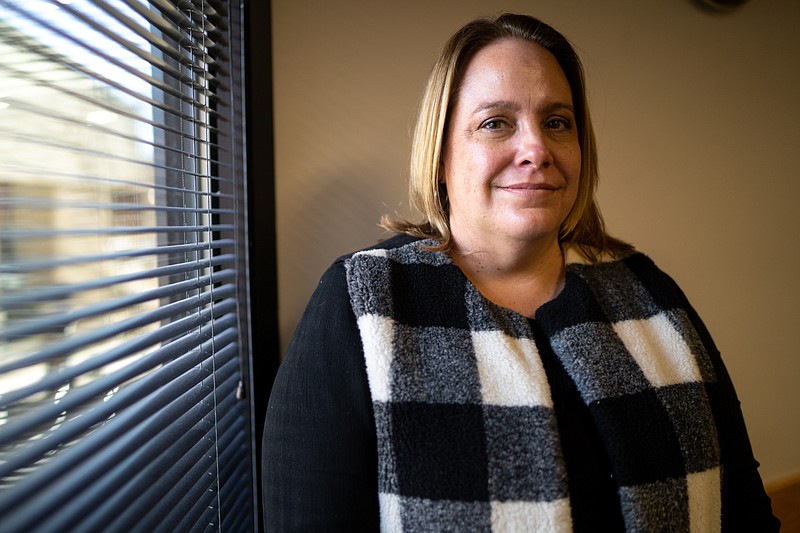JEFFERSON CITY, Mo. -- As part of his proposed $46 billion budget for 2022-23, Gov. Mike Parson included massive investments in the state's health and mental health efforts.
His record budget included millions of dollars in support for veterans homes, autism centers, behavioral health centers, community health centers and community-based services. It also included millions of dollars to support agencies on aging and organizations serving the developmentally disabled.
One of its largest investments sets aside $955 million to standardize health care and mental health care provider rates and incentivize them to earn value- based payments.
Standardization and value-based payments are closely tied, said Valerie Huhn, director of the Missouri Department of Mental Health (DMH).
Through standardization, the state is getting all its providers equalized in terms of rates paid to them. Once that is done, the state can incentivize providers to produce good outcomes.
For years, Huhn said, the Division of Developmental Disabilities has been working to get rates standardized. The proposed budget includes money that finishes that process for providers. The budget also raises rates for providers up to $15 per hour for direct care.
"We've got them where they need to be to deliver a very good base service," Huhn said. "Now, we want to reward those providers that are doing more -- that are taking those extra trainings."
The state knows that providers who follow specific trainings and implement specific practices are going to have better outcomes with certain folks with behavioral health needs, she said.
Missouri has identified benchmarks for payments.
"One of the value-based payments is around helping providers meet all those trainings," Huhn said. "If you are willing to do all that, we will provide a payment for that. In the future, then we may have another payment, where there's a shared savings payment because they've been able to decrease emergency room visits or law enforcement involvements. Those are the measure-ables for value-based payments."
Value-based payments for employment
There are also value-based payments around employment.
Huhn said some of her favorite services offered through the DMH are those that get people with developmental disabilities or with behavioral health challenges into the workforce.
"Our goal is, if you can work," she said, "that you can work."
The department wants its clients, who may still require support of service packages, to become wage-earning, taxpaying citizens. It has a whole set of services around employment that providers can offer.
If someone can work and doesn't have a direct-support professional with them, supporting them; if the employment professional is able to kind of fade away from providing those services, Missouri can see the savings that are occurring for its system, and the worker contributes to the tax base, Huhn said. That's another place where the state can build-in value-based payments.
The state wants people to look at technology as a service option, predominantly because it knows it's never going to have enough direct support professionals. So, it needs people to be using services as smartly as they can use them.
There is a lot of "really cool technology out there" to help providers and clients, she said. It's technology that gives some the ability to live more independent lives.
Missouri already supports a lot of individuals through technology.
It has the ability to work with providers to get somebody into a really technologically supported environment. And then the state can share savings.
"Instead of having a direct support professional stay the night with somebody 365 days a year, we've had a lot of success with technology as that support," Huhn said. "That is a significant cost savings for the system. It frees up workforce. It increases independence for the individuals we support. They're happier. Everybody's happier."
Another piece of the funding will be used to "re-base nursing facility rates," or assess and update them to match the actual cost of operating nursing homes.
Update on staffing issues
Staffing remains an issue across the board.
DMH has had to close wards in state hospitals, like Fulton, because of low staff. It's not taking new admissions at some facilities.
Across the entire Division of Behavioral Health, the department had 91 percent turnover for its support care assistants in December.
Support care assistants are those employees who work directly with clients, helping them with daily living activities, such as feeding, bathing, bed-making, shaving, dressing and other related tasks. The assistants also help by checking vital signs, height and weight as assigned, according to the Missouri Office of Administration website. They collect and maintain records of fluid intake and output, and report on the condition of clients. They may perform internal environment-of-care checks or perform security-related functions in a mental health-care setting.
As part of the governor's push to increase state worker pay, to make it competitive with the private sector, people in those positions would benefit from Parson's proposed $15 an hour minimum wage, Huhn said.
She added there is additional money that goes unnoticed that is intended to help overcome salary compression -- when someone who has been on the job for a time period makes about the same or less than new hires.
So, when the state moves support care assistants up to the $15 range, the employees would be making similar wages to security support care assistants, who may work directly with psychiatric and/or sex-offender clients in maximum and intermediate security areas.
There would not have been enough difference between the two job classes, Huhn said.
Additionally, contractors for the Division of Developmental Disabilities had rates that last year got them up to $12.39 per hour. (The employees making $12.39 are providing "base-level services. If clients have higher acuity needs, the rate goes up.) Contractors testified in budget hearings that, much like the state, they can't keep staff at those low rates.
"We're really struggling. We have not gained employees across our whole system," Huhn said.
"It doesn't matter where you're at -- if you're in St. Louis, St. Joe, Farmington, Fulton," she said. "We lose more employees every month than we hire.
"Of course, we're worried about our support care positions because those are the bulk of our workforce as a state agency."
The other shoe the state is worried about is professional staffing.
"Nursing -- that is a struggle," she said. "It's a struggle across the whole system right now. As a state agency, we don't have the ability to do some of the things that private hospitals do. So, it does make it more difficult."
Missouri is more reliant on contracted staffing for all positions than it ever has been, she added, especially for clinical position.
"That does impact morale," Huhn said. "When you have somebody -- a contractor that can come in and make more money than you do -- you ask yourself, 'Why am I still sitting here doing this job still? Especially when I know I can go to any hospital in this state and get what they're getting for coming in here.'
"That is really impacting our morale and is concerning," she continued. "We're all concerned about it."
Health care capital projects
The governor's proposed investments in people and health care are extensive. So are the requested investments in health facilities.
The budget includes $139.5 million for capital improvement grants to Federally Qualified Health Centers and Certified Community Behavioral Health Organizations to expand services for underserved populations, support COVID-19 accommodations and expand programs to meet demand for behavioral health and substance use disorder services, according to the governor's plan for ARPA funds.
DMH capital projects include $3 million to create a new 15-bed inpatient unit with a team of clinicians do address challenges posed by people with dual diagnoses of developmental disabilities in need of psychiatric care.
The budget would commit about $37.2 million to expand sex offender rehabilitation treatment services at Fulton State Hospital and Southeast Missouri Mental Health Center.
The state has awarded matching grants to 25 primary care providers and 35 behavioral health care providers through the ARPA funding.
Proposed projects valued at under $5 million require a 40 percent match. Projects of $5 million and higher require a 50 percent match.
Two projects in the Jefferson City area qualified for grants.
Community Health Center of Central Missouri (CHCCM) requested a grant to help with construction of a new Women & Children's Clinic. The total project cost is estimated at $10 million. It will have to match $5 million.
The clinic would increase access to medical, dental and behavioral health services for pregnant moms and children the new building is expected to allow the center to offer additional services during high-risk pregnancies.
The focus would be to provide integrated comprehensive care to help improve health outcomes of children and pregnant moms, according to a description provided to the state.
The center, at 1511 Christy Drive, Jefferson City, would use its current space to expand medical, dental and behavioral services to adults.
"The underserved patients we are privileged to serve face many barriers to care," the description said. "It is the CHCCM's priority to offer as many services as possible in-house to help break down those barriers to keep individuals healthy and out of the hospital."
The funding would allow the center to renovate and expand its site to better serve the community by bringing a pharmacy and additional lab services in-house, the description states.
New Horizons Community Support Services, which helps people with severe and persistent mental illnesses who may also have co-occurring substance use disorders, qualified for a grant. The behavioral health provider would update flooring and telephone, intercom and conferencing equipment in three buildings. It would also provide security cameras for four buildings.
The total cost of the project is estimated at $288,500. New Horizons would be responsible for matching $115,400. The grant would help the organization provide behavioral health services to persons with severe and persistent mental illness, according to its description of the project.



